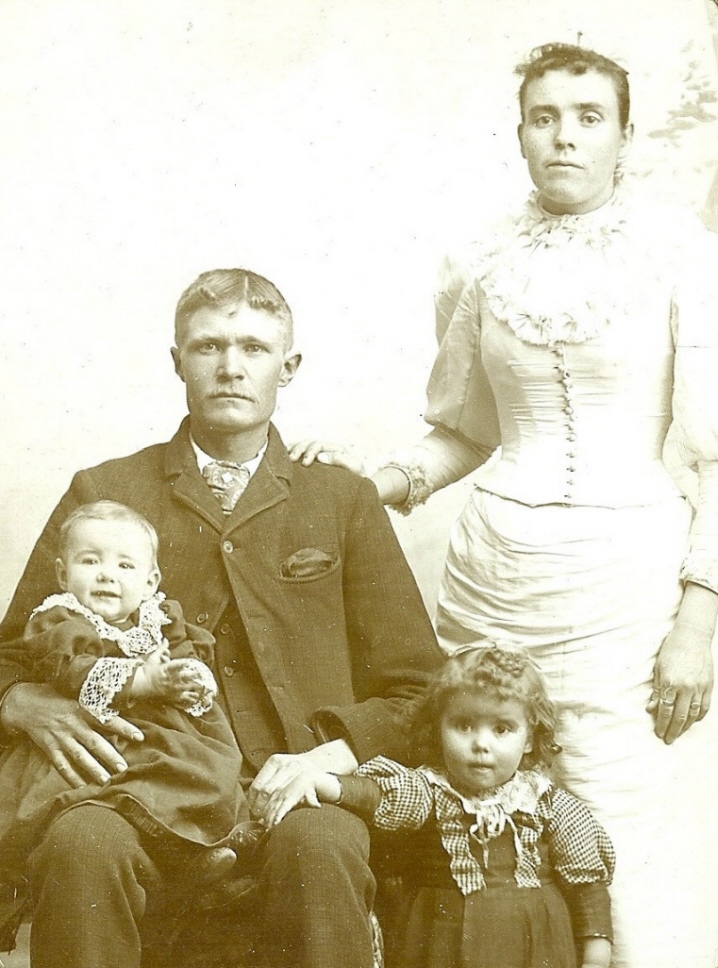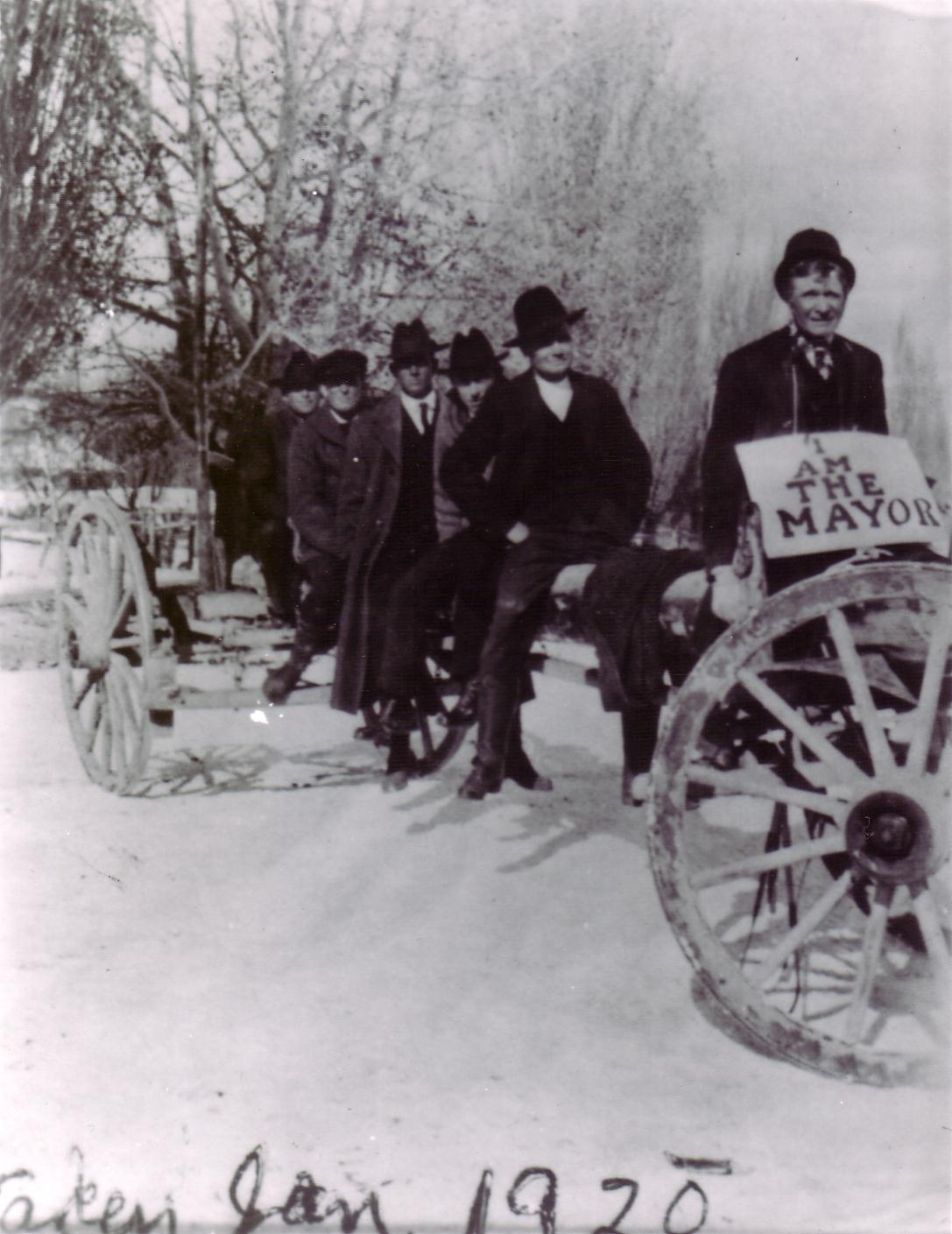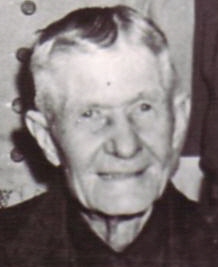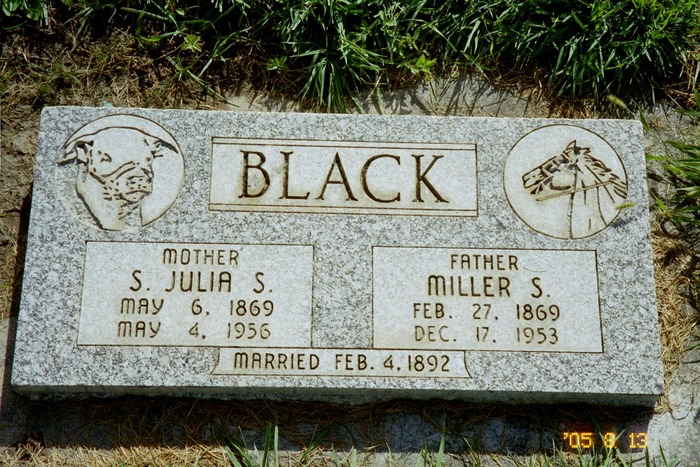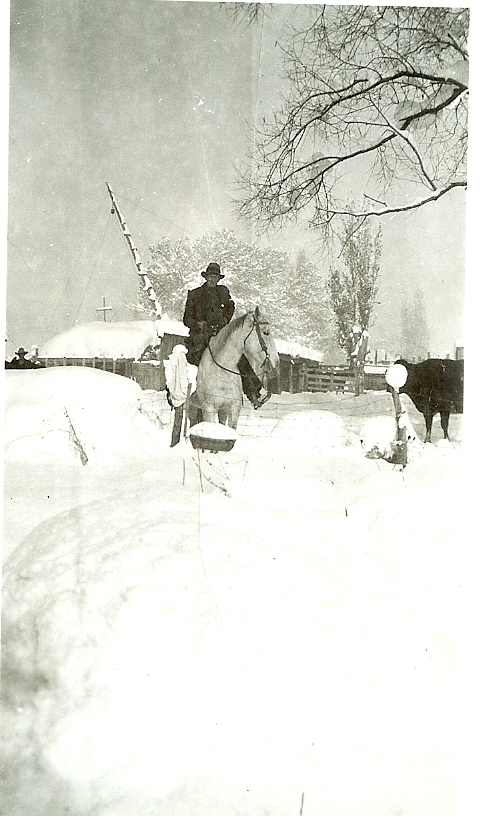Complied by Cloe Truman Anderson, Granddaughter
This information was given to a granddaughter, Cloe Truman Anderson, in 1953; grandfather was 84 years old at the time and was bedridden. He suffered a stroke while shoveling snow at his home in Huntington, Utah. He had the stroke on the 17th of December and lived for exactly two years. He died on the 17th of December 1953. His son LaVar and two daughters, Nora and Meleta took turns caring for him in their homes until he died. They would each take him for two months at a time.
I, Miller Snow Black was born in Washington, Washington County, Utah February 27th, 1869. I was the fifth child of Maria Hansen, and my father was William Morley Black. I lived at Washington until I was four or five years old, and then moved with my family to Long Valley in Kane County I went to school in Long Valley with about fifteen other children. Mrs. John R. Young was our teacher. We lived in Long Valley for about three or four years and then father moved his families.
The people of Orderville lived the Lord's Law of Consecration, which meant that everything was held in common. I was among the young boys who herded the cattle on the hills surrounding the valley in the spring, summer and fall. We attended school for several months during the winter. Father, William Morley Black, was secretary of the order as well as supervisor of the community kitchen. It was a big lumber multi-purpose room about 40 ft. by 80 ft. where most of the community activities were held. School was held in the building as well as church services, dances and three meals a day were served to the residents of the community. The men were fed in order of their priesthood and then the women and the children were fed. We young people didn't know that a chicken had anything but a neck until we were fourteen years old, when I was advanced in the Priesthood. My Father, William Morley Black had six wives when we lived in the order. I didn't think polygamy was at all bad when you were raised in it. All of the wives had their special duties, and we children called all the other wives aunt. My Mother was a midwife and helped with the birth of many babies when we were in the order. Brigham Young died in 1877 and with his strong leadership the United Order was successful and flourished, but after his death it was as the ship had lost its captain and all kinds of problems arose. My Dad was Secretary of the United Order and a young couple withdrew their goods to leave the order and Dad was criticized for having given too much for the time and the goods they had contributed.
In 1884 we left the United Order and moved to Huntington, Utah. I helped with farming and attended school two or three months in the winter after moving to Huntington. When I was 17 years old I carried the mail on horseback from Huntington to Emery, a job I held for over a year.
On the 13th day of October 1890, I took mother and Aunt Mirinda in a covered wagon to Diaz, Old Mexico to be with father. Father had to leave the country because those who were polygamists were persecuted when the U. S. Government declared polygamy to be against the law. It was a difficult journey but we felt we made pretty good time as we got there for Christmas. We stayed through the winter and got home in May.
On the fourth of February 1892, I married Susan Julia Sherman. We lived in a frame home on west Center Street. I was engaged in farming and stock raising. A few years after we were married, I was ask by the Supervisor of the Manti National Forest to serve as the second ranger of that forest. I was the ranger for a little over a year. I was elected as the first Mayor of Huntington in 1920. I had served two years before that on the town board. Seven years after my term as Mayor I was appointed to the City Council to fill the vacancy left the death of Ray Grange. I was Emery County Commissioner for one term in 1936. I served on the Huntington Canal Board for eight years and was President of the Huntington Cattlemen's Association. I was overseer in the building of the seminary building in Huntington. We put in the cement walks and sewer when I was the mayor. I was Chairman of the Finance Committee of the new church in Huntington when it was dedicated April 27, 1953.
In 1906 I bought a large herd of cattle, (120 head). It was an unusually severe winter, there was a very heavy snowfall that covered all the vegetation in the valley and there was no hay for sale. I lost over half of the herd and it was a serious financial blow for us.
At 84 I still read without glasses. We have lived sixty-two years together in Huntington in only three homes; two of them were on the same lot. I had three brothers and four sisters who grew up and were old people before passing away.
About 1903 Grandpa Black drove a herd of cattle to Price, put them on the train and took them to Kansas City, as there was no sale for them locally. At the time Lyman was baby and had whopping cough. When they got to a farm in Kansas, a farmer was very disappointed that his butcher hadn't shown up to kill his steer. Grandpa said, "We can butcher that critter for you." The farmer was very surprised that they were able to do such a professional butchering job.
Complied by Cloe Truman Anderson, Granddaughter
This information was given to a granddaughter, Cloe Truman Anderson, in 1953; grandfather was 84 years old at the time and was bedridden. He suffered a stroke while shoveling snow at his home in Huntington, Utah. He had the stroke on the 17th of December and lived for exactly two years. He died on the 17th of December 1953. His son LaVar and two daughters, Nora and Meleta took turns caring for him in their homes until he died. They would each take him for two months at a time.
I, Miller Snow Black was born in Washington, Washington County, Utah February 27th, 1869. I was the fifth child of Maria Hansen, and my father was William Morley Black. I lived at Washington until I was four or five years old, and then moved with my family to Long Valley in Kane County I went to school in Long Valley with about fifteen other children. Mrs. John R. Young was our teacher. We lived in Long Valley for about three or four years and then father moved his families.
The people of Orderville lived the Lord's Law of Consecration, which meant that everything was held in common. I was among the young boys who herded the cattle on the hills surrounding the valley in the spring, summer and fall. We attended school for several months during the winter. Father, William Morley Black, was secretary of the order as well as supervisor of the community kitchen. It was a big lumber multi-purpose room about 40 ft. by 80 ft. where most of the community activities were held. School was held in the building as well as church services, dances and three meals a day were served to the residents of the community. The men were fed in order of their priesthood and then the women and the children were fed. We young people didn't know that a chicken had anything but a neck until we were fourteen years old, when I was advanced in the Priesthood. My Father, William Morley Black had six wives when we lived in the order. I didn't think polygamy was at all bad when you were raised in it. All of the wives had their special duties, and we children called all the other wives aunt. My Mother was a midwife and helped with the birth of many babies when we were in the order. Brigham Young died in 1877 and with his strong leadership the United Order was successful and flourished, but after his death it was as the ship had lost its captain and all kinds of problems arose. My Dad was Secretary of the United Order and a young couple withdrew their goods to leave the order and Dad was criticized for having given too much for the time and the goods they had contributed.
In 1884 we left the United Order and moved to Huntington, Utah. I helped with farming and attended school two or three months in the winter after moving to Huntington. When I was 17 years old I carried the mail on horseback from Huntington to Emery, a job I held for over a year.
On the 13th day of October 1890, I took mother and Aunt Mirinda in a covered wagon to Diaz, Old Mexico to be with father. Father had to leave the country because those who were polygamists were persecuted when the U. S. Government declared polygamy to be against the law. It was a difficult journey but we felt we made pretty good time as we got there for Christmas. We stayed through the winter and got home in May.
On the fourth of February 1892, I married Susan Julia Sherman. We lived in a frame home on west Center Street. I was engaged in farming and stock raising. A few years after we were married, I was ask by the Supervisor of the Manti National Forest to serve as the second ranger of that forest. I was the ranger for a little over a year. I was elected as the first Mayor of Huntington in 1920. I had served two years before that on the town board. Seven years after my term as Mayor I was appointed to the City Council to fill the vacancy left the death of Ray Grange. I was Emery County Commissioner for one term in 1936. I served on the Huntington Canal Board for eight years and was President of the Huntington Cattlemen's Association. I was overseer in the building of the seminary building in Huntington. We put in the cement walks and sewer when I was the mayor. I was Chairman of the Finance Committee of the new church in Huntington when it was dedicated April 27, 1953.
In 1906 I bought a large herd of cattle, (120 head). It was an unusually severe winter, there was a very heavy snowfall that covered all the vegetation in the valley and there was no hay for sale. I lost over half of the herd and it was a serious financial blow for us.
At 84 I still read without glasses. We have lived sixty-two years together in Huntington in only three homes; two of them were on the same lot. I had three brothers and four sisters who grew up and were old people before passing away.
About 1903 Grandpa Black drove a herd of cattle to Price, put them on the train and took them to Kansas City, as there was no sale for them locally. At the time Lyman was baby and had whopping cough. When they got to a farm in Kansas, a farmer was very disappointed that his butcher hadn't shown up to kill his steer. Grandpa said, "We can butcher that critter for you." The farmer was very surprised that they were able to do such a professional butchering job.
Family Members
-
![]()
Joseph Andrew Black
1861–1940
-
![]()
Rachel Ann Black Porter
1863–1906
-
![]()
Olive Myrtle Black Palmer
1865–1949
-
William Sanford Black
1867–1868
-
![]()
Harriet Drucilla Black Guymon
1871–1965
-
![]()
David Patten Black
1874–1958
-
![]()
Morley Larsen Black
1875–1951
-
![]()
Ablonne Black Chapple
1880–1959
-
Mary Elizabeth Black
1846–1847
-
![]()
Martin Luther Black
1848–1918
-
![]()
Martha Jane Black Gale
1849–1921
-
![]()
Tamar Jane Black Young
1852–1915
-
Sarah Emma "Olive" Black
1853–1853
-
William Kimball Black
1854–1856
-
![]()
Sarah Amelia Black Young
1854–1950
-
![]()
John Morley Black
1856–1933
-
![]()
William Grant Black
1857–1948
-
![]()
Isaac Edwin Black
1857–1931
-
![]()
Benjamin Daniel Black
1859–1945
-
![]()
Mary Ann Black Palmer
1861–1880
-
![]()
George Henry Black
1861–1923
-
Daniel Wells Black
1862–1865
-
![]()
Charles Theodore Black
1864–1924
-
![]()
Eva Minerva Black Palmer
1866–1950
-
![]()
Margaret Ellen "Maggie" Black Rowley
1869–1961
-
![]()
William Washburn Black
1870–1884
-
![]()
Orson Pratt Black
1871–1946
-
![]()
Catharine Amelia Black
1873–1873
-
![]()
Mary Belle Black Carroll
1875–1955
-
![]()
Parley Pratt Black
1875–1948
-
![]()
Calista Black Peel
1876–1955
-
![]()
Amy Jane Black Carroll
1877–1959
-
Eliza Roxie Black
1880–1891
-
![]()
Etta Clarinda "Clara" Black Webb
1880–1966
-
![]()
Edward Webb Black
1881–1958
-
Lewis Almon Black
1884–1884
-
![]()
Lula Lorraine Black Drummond
1885–1968
-
![]()
Ella Civilla Black Talley
1888–1926
-
![]()
Junius Exile Black
1893–1977
Sponsored by Ancestry
Advertisement
Explore more
Sponsored by Ancestry
Advertisement













































